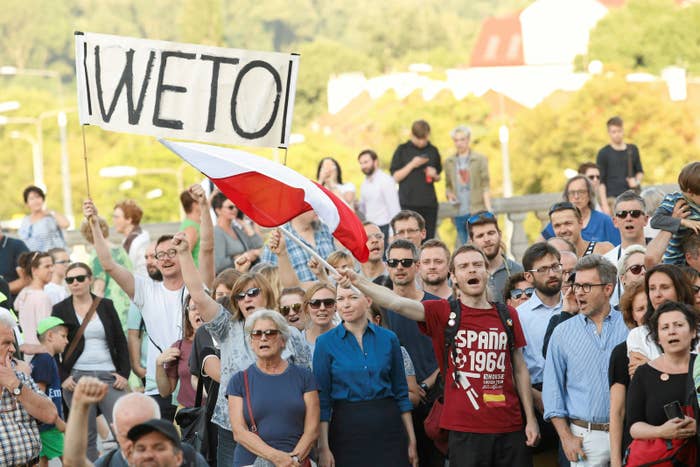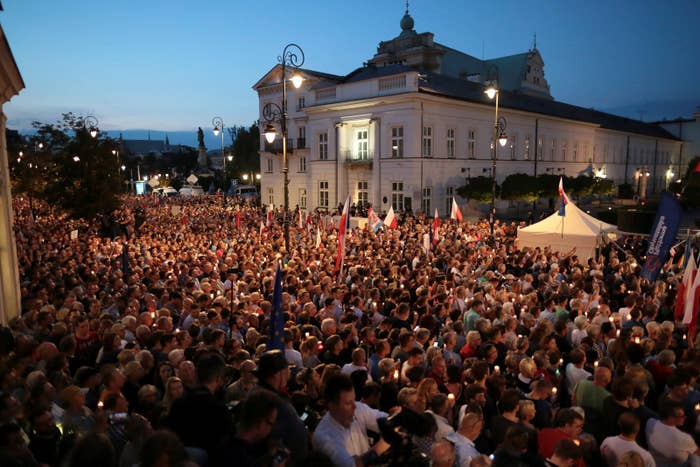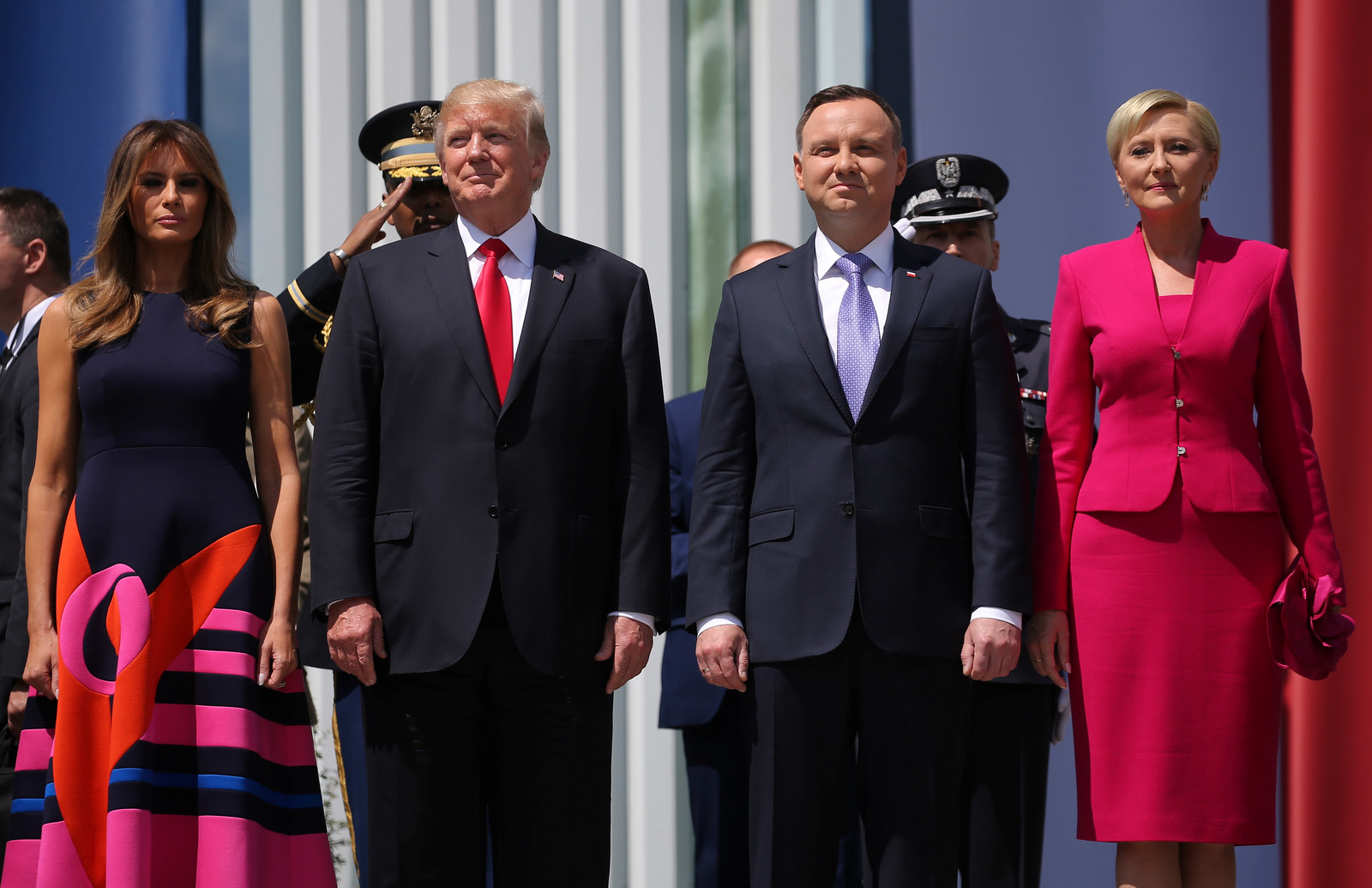
Tens of thousands of Poles took to the streets on Thursday to protest a law that subordinates the country’s Supreme Court to Poland’s nationalist ruling party. An estimated 50,000 people came out to protest the law in the capital Warsaw alone, with tens of thousands more joining in other cities and smaller towns across the country.
Despite growing protests at home and warnings from the EU, the lower house of the Polish parliament passed a bill strengthening the grip of the ruling Law and Justice party (PiS) over the judiciary. Under the new law, all current judges on the Supreme Court will be dismissed and the justice minister will appoint new ones.
The bill still has to be passed by the upper house of the Polish parliament, the Senate, and signed into effect by Polish President Andrzej Duda.
In a last desperate attempt to block what they see as the end of democracy in the country, the opposition called on protesters to gather outside the presidential palace in Warsaw demanding that Duda veto the law. Poles also brought candles to local courthouses and chanted “Free Courts!” across the country.

Under the Law and Justice party, Poland has embarked on building an illiberal democracy similar to Viktor Orban’s in Hungary, purging much of the army’s leadership, inserting political loyalists throughout the civil service and further limiting women’s reproductive rights in the Catholic country.
“It is a very sad day for Poland and for all of us,” Polish human rights ombudsman Adam Bodnar said in parliament during the vote.
Jaroslaw Kaczynski, the leader of the Law and Justice party commonly known as “the Chairman,” has said that Polish courts need a “radical reform” because they are “subordinate to foreign forces.” As head of the president and prime minister’s party, he’s considered Poland’s de facto leader.
“The Polish justice system has a deep sickness which is the collapse of moral principles,” he told Polish state television, which his party has transformed into a propaganda channel akin to Russian state media in less than a year.
The 68 year-old veteran Polish politician maintains that Poland’s judicial system is filled with “post communists” and that his party wants to rid the courts of judges who served in the previous communist regime that ended 28 years ago.
His nationalist Catholic party rose to power with this belief in November 2015 and has since been accused of reversing the reforms the young democracy underwent since the end of communism in 1989 and joining the EU in 2004.
Kaczynski has also built political capital around a heated conspiracy theory that has divided Poland for seven years: the 2010 plane crash that killed his identical twin brother and then-president, Lech, in Smolensk, Russia. He’s held monthly vigils in central Warsaw in which he pledges to his supporters that Poland is “nearing the truth” about the crash that he blames on the Kremlin and his domestic foes ever since — 89 of them so far.
During the heated debate of the Supreme Court law in parliament he accused the opposition of murdering his brother.
“Do not wipe your treasonous mugs with my brother’s name. You destroyed him, you murdered him. You are scum,” he said to the sound of applause.
Kaczynski himself once said he wanted to “build a Budapest on the Vistula [the river that flows through Warsaw].” In 2014, he said that “everything must be done for Poland to be like Turkey.” His party has also historically been strongly anti-German.
The passing of the Supreme Court law came just days after Law and Justice introduced two other bills to strengthen its control over the country’s legal system. Last week, the parliament passed a bill dissolving the National Judicial Council, an independent body that chooses Polish judges. Members of the council will now be appointed by ruling party politicians and the justice minister will have the power to appoint and dismiss the heads of lower courts.
The Supreme Court is the last legal institution over which the ruling party did not have control. Shorty after gaining power, Law and Justice moved to control Poland’s Constitutional Tribunal, provoking a constitutional crisis and a conflict with the EU, both of which it subsequently won.

This has left Poland isolated within the EU, defended only by Hungary. But a recent visit by Donald Trump, in which the US President praised Poland in front of pro-government crowds bussed in from all over the country, has boosted the government’s confidence.
But the State Department was wary in a statement it released on Thursday: “We are worried about the Polish government’s plans to adopt laws that seem to limit judicial powers.”
Brussels has so far been unable to halt Poland’s assault on the rule of law. Warsaw ignored the warnings of the European Commission when the government took over the Constitutional Tribunal a year ago. But the upcoming takeover of the Supreme Court has drastically escalated the conflict between the EU and its rebel member state.
On Wednesday, the Vice President of the European Commission Frans Timmermans said the Supreme Court law would “collectively abolish any remaining judicial independence” in Poland. He also warned the EU is “very close” to triggering what are known Article 7 proceedings against Poland, which could lead to the suspension of Poland’s voting rights in Brussels. (It would be the first time these sanctions were used.)
But even if the EU was intent on doing so, it would need a unanimity from EU member states — and Hungary is unlikely to turn its back on Warsaw. “We stand by Poland, and we call on the European Commission not to overstep its authority,” Hungarian Foreign Minister Peter Szijarto said on Thursday.
Polish government officials rejected an “urgent” request from European Council President Donald Tusk, a former Polish Prime Minister himself, to meet with President Duda. In an emotional statement on the day of the vote, Tusk said developments in Poland “transport us - in the political sense - in time and in space: backwards and eastwards.”
Polish Foreign Minister Witold Waszczykowski denounced Tusk’s appeal to the Polish president as interference. “Donald Tusk is there to defend Polish interests in Brussels, and not to get involved in our internal political process,” he said.
But tonight in Warsaw, thousands of Poles are worried this government is taking them back in time into their authoritarian past and eventually out of the EU.

